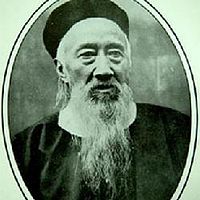
Back تشانج تشيدونج ARZ Zhang Zhidong Catalan Zhang Zhidong German Zhang Zhidong Finnish Zhang Zhidong French 張之洞 GAN Zhang Zhidong ID 張之洞 Japanese 장지동 Korean Zhang Zhidong Dutch
Zhang Zhidong 張之洞 | |
|---|---|
 | |
| Grand Councillor | |
| In office 1907–1909 | |
| Grand Secretary of the Tiren Hall | |
| In office 1907–1909 | |
| Assistant Grand Secretary | |
| In office 1907–1907 | |
| Viceroy of Huguang | |
| In office 1904–1907 | |
| Preceded by | Duanfang (acting) |
| Succeeded by | Zhao Erxun |
| In office 1898–1902 | |
| Preceded by | Tang Jixun (acting) |
| Succeeded by | Duanfang (acting) |
| In office 1896–1898 | |
| Preceded by | Tang Jixun (acting) |
| Succeeded by | Tang Jixun (acting) |
| Viceroy of Liangjiang | |
| In office 1902 – 1903 (acting) | |
| Preceded by | Liu Kunyi |
| Succeeded by | Wei Guangtao |
| In office 1894–1896 | |
| Preceded by | Liu Kunyi (acting) |
| Succeeded by | Liu Kunyi (acting) |
| Viceroy of Liangguang | |
| In office 1884–1889 | |
| Preceded by | Zhang Shusheng |
| Succeeded by | Li Hanzhang |
| Personal details | |
| Born | 2 September 1837 Xingyi Prefecture, Guizhou Province, Qing Empire |
| Died | October 4, 1909 (aged 72) Beijing, Qing Empire |
| Children | 10 |
| Occupation | Politician |
| Zhang Zhidong | |||||||||||||||
|---|---|---|---|---|---|---|---|---|---|---|---|---|---|---|---|
| Traditional Chinese | 張之洞 | ||||||||||||||
| Simplified Chinese | 张之洞 | ||||||||||||||
| |||||||||||||||
Zhang Zhidong (Chinese: 張之洞) (2 September 1837 – 4 October 1909) [1] was a Chinese politician who lived during the late Qing dynasty. Along with Zeng Guofan, Li Hongzhang and Zuo Zongtang, Zhang Zhidong was one of the four most famous officials of the late Qing dynasty.[citation needed] Known for advocating controlled reform and modernization of Chinese troops, he served as the governor of Shanxi Province and viceroy of Huguang, Liangguang and Liangjiang, and also as a member of the Grand Council. He took a leading role in the abolition of the Imperial examination system in 1905. The Red Guards destroyed his tomb in 1966 during the Cultural Revolution. His remains were rediscovered in 2007 and reburied.
- ^ "Encyclopædia Britannica". www.britannica.com. 19 March 2024. Retrieved 19 March 2024.
© MMXXIII Rich X Search. We shall prevail. All rights reserved. Rich X Search